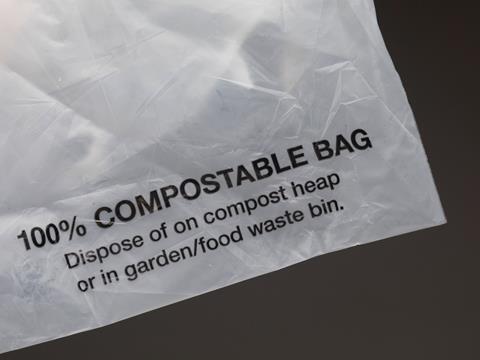
A consumer behaviour trial run by the Compostable Coalition UK has revealed that the number of consumers disposing of their compostable packaging in food waste bins increased five-fold once they were provided with educational material and clear compostability labels.
The six-week trial involved residents of Medway in southeast England, with 120 households informed that they could throw their compostable packaging in their food and garden waste bins. Advice on this matter can vary between local authorities, as it is not currently a national mandate in the UK.
As part of the trial, each household received boxes containing confectionery, snack food, fresh produce, tea bags, coffee pods, and shopping bags from Co-op, Ocado, Lipton Teas, and other brands. The products were packaged in both plastic and compostable materials, with the latter identified by newly developed labels from Hubbub and OPRL.
Participants were also provided with other educational resources designed by Hubbub with insight from behavioural scientists at the University of Sheffield. These resources encouraged residents to check packaging labels and use their food waste bins, and explained the composting process.
The results suggest that clear communication and labelling can help consumers identify and correctly dispose of compostable packaging.
Contamination levels in food and garden waste bins were also said to decrease from an average of 9% to 3% by the end of the testing period. 23% more food waste also entered food waste bins during the trial’s duration.
M&S, Ocado, and WWF are among the Compostable Coalition UK’s advisory board members.
“We were delighted to participate in this trial which has delivered such positive results,” said Laura Fernandez, senior Packaging and Sustainability manager at Ocado Retail. “Ocado remains committed to continued collaboration with the industry to determine the role compostable packaging can play in the circular economy, especially when supported by an effective collection, sorting and recycling infrastructure.”
“This trial reinforces the message that providing consumers with clear, visible labels can have a positive impact on both participation and contamination,” continued Alice Harlock, director of Technical and Member Services OPRL. “The findings of the pilot back up OPRL’s own consumer research, which shows that consumers look for information on recycling at the point of disposal.
“In our survey, the majority – 54 per cent – also reported that the greatest barrier to recycling was confusion over whether items were recyclable. So we can be confident that tackling confusion with clear labels and instructions will help to drive greater volumes of material for recycling.”
Tom McBeth, Policy and Infrastructure manager at RECOUP, stated: “Having conducted the analysis of the organic waste stream for 6-weeks during the trial, RECOUP witnessed a steady but noticeable decline in contamination of the food waste samples, as well as an increase in overall volumes of food waste disposed of correctly.
“More engagement would need to be done to help ensure a clean waste stream overall, but this really helped to show the importance of engagement with citizens with regards to disposal of their waste.”
Julia Schifter, VP Strategy Analysis at TIPA and co-founder of the Compostable Coalition UK, concluded: “Compostable Packaging offers a new way to achieve circularity for some of the most challenging hard-to-recycle’ plastics. Yet, the proper collection and treatment of compostables is key to achieve a full circularity for these products.
“The results of our study clearly prove that once consumers are provided with a label that positively instructs them where to discard such packages, their ability to behave accordingly increased dramatically.
“Moreover, it also increased their overall disposal of food waste in the food waste bin while significantly reducing contamination. These results, among other studies conducted by the Compostable Coalition UK, are aimed at servicing DEFRA’s future policy direction on compostable plastics and their role in addressing the planetary plastics waste crisis.”
The Coalition also conducted a composting trial at EnVar, one of the largest composting sites in the UK. This involved 13 tonnes of compostable items like coffee pods, tea bags, fresh produce packaging, twist wraps, snack food packaging, and single-use service ware being tested for biodegradability under the standard operating conditions of an industrial composting site.
Apparently, products supplied in their ready-to-use state biodegraded successfully. The finished compost passed PAS100 certification for high-quality compost standards.
51% of UK councils currently offer food waste collection systems and 17% provide co-mingled food and garden waste collection services. Many of them do not include compostable packaging as a target, however, with concerns raised around contamination and processing.
DEFRA’s Simpler Recycling Reform is set to mandate food waste collection from all English households by 2026, and the Compostable Coalition UK’s data on compostable packaging is hoped to provide additional evidence to “inform future guidelines”.
The Coalition also aims to keep engaging with all key relevant stakeholders to ‘further disseminate results and identify where compostable packaging can be integrated with waste management systems where appropriate’.
Its ‘Closing the Loop for Compostable Packaging’ research project commenced early last year. Funded by UKRI’s £60 million Smart Sustainable Plastic Packaging Challenge, it sought to establish whether existing collection and treatment streams in the UK can collect, sort, and recycle compostable packaging – weighing up the potential to replace hard-to-recycle plastic packaging with compostable alternatives.
These projects come after the University College London ’s Big Compost Experiment asserted that biodegradable and compostable plastic packaging cannot be effectively composted at home. It underlined improvements in compostability, dedicated sorting and collection systems, and clearer communication with customers regarding the composting process for packaging as areas of improvement going forward.
If you liked this article, you might also enjoy:
The L’Oréal approach to packaging sustainability
The way we talk about plastic needs to change – here’s how to get it right
What steps is Apple taking to make its packaging more sustainable?














No comments yet